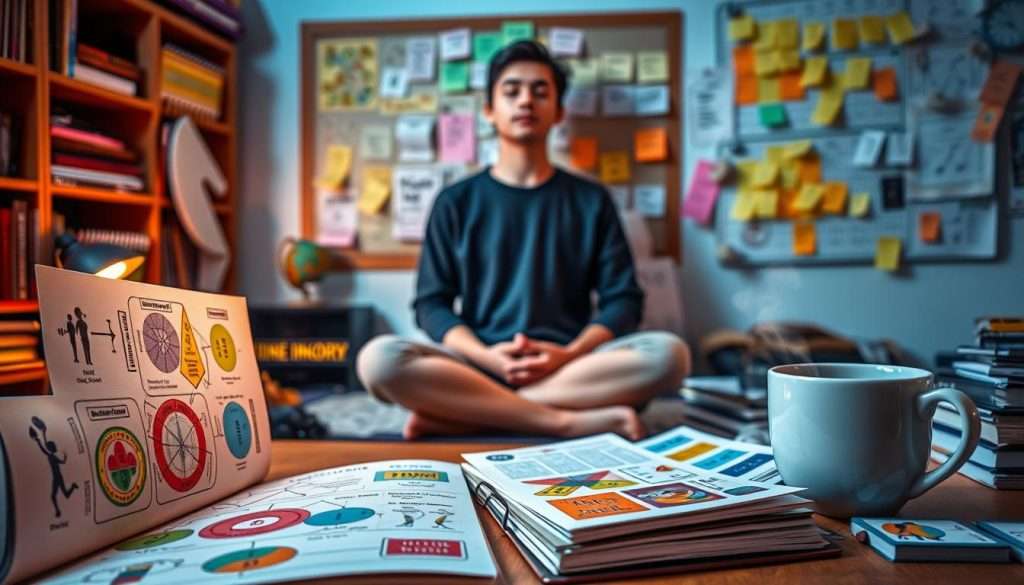Feeling overwhelmed by study sessions is common. Many students find it hard to stay focused and remember what they learn. You’re not alone in this struggle.
Nancy, a Business Technology Management student at JMSB, shares her tips. She says finding your classroom, planning your week, and setting up a good study space are key. These simple steps can help you boost your study productivity and reach your goals.
Changing how you study can make it more enjoyable. In this article, we’ll share practical tips. These will help you develop effective study habits and do well in school.
Key Takeaways
- Plan your weekly schedule to stay organized
- Set up a conducive study space to boost productivity
- Develop effective study habits to achieve academic success
- Stay focused and retain information with the right strategies
- Transform studying into an enjoyable experience
The Science Behind Effective Studying
Effective studying isn’t just about spending a lot of time studying. It’s about knowing how your brain handles information. When you understand how your brain works, you can make your study methods better.
How Your Brain Processes Information
Our brains use a complex network of neurons to process information. When you study, you create new connections between these neurons. The more you review and practice, the stronger these connections get.
Dr. Selina Samuels says treating everything as a draft can help. This approach helps you focus on the process, not just the outcome. It makes your study sessions more effective.
Common Study Misconceptions
Many students think re-reading their notes is a good study technique. But research shows it doesn’t help much in the long run. Active recall, like testing yourself, is much better.
Another mistake is thinking studying for long without breaks is good. But breaks actually help you focus and remember better.
Why Traditional Methods Often Fail
Traditional study methods often don’t work because they don’t fit everyone’s learning style. What works for one person might not work for another. They also often focus on memorizing instead of understanding and applying.
To do better, try different study techniques to find what works for you.
| Traditional Method | Effective Alternative |
|---|---|
| Passive re-reading | Active recall through self-testing |
| Long study sessions without breaks | Regular breaks using the Pomodoro Technique |
By understanding the science of studying, you can improve your study skills and get better results. It’s about being smart, not just working hard.
Creating Your Optimal Study Environment
Turning your study area into a productivity zone is key for learning well. We need a space that helps us concentrate and keeps distractions away. This way, we can study more efficiently.
Designing a Dedicated Study Space
Having a dedicated study area is vital. You don’t need a whole room; a tidy corner or a quiet library spot works great. Make it your own with things that motivate you, like quotes or plants.
Essential Tools and Materials
The right tools can really boost your study sessions. Studies show that noise-cancelling headphones, a planner, and an ergonomic laptop stand help a lot. These study hacks keep you focused and prevent tiredness.
Environmental Factors: Lighting, Sound, and Temperature
Environmental factors are key for a great study space. Make sure it has good lighting, like natural light. Use noise-cancelling headphones or background music to help focus. Keep the temperature comfy to avoid distractions.
Managing Digital and Physical Distractions
To study efficiently, managing distractions is crucial. Turn off device notifications or use apps to stay focused. Keep your space organized and essential items within reach. This way, you can focus on your study strategies and reach your goals.
Strategic Planning: The Key to Make Your Study Sessions a Breeze
To make the most of your study sessions, you need a strategic plan. This plan includes setting clear goals, understanding your learning style, and organizing your study materials. By doing so, you can optimize your study time, reduce stress, and improve your overall learning experience.
Developing a Personalized Study Schedule
Creating a study schedule tailored to your needs is crucial. It helps you stay on track with assignments and deadlines. As Nancy suggests, planning out a weekly schedule and sticking to it can significantly enhance your study productivity. Consider your most productive times of the day and allocate your most challenging study sessions then.
Here’s an example of how you can structure your study schedule:
| Day | Topic | Time |
|---|---|---|
| Monday | Math | 9:00 AM – 10:30 AM |
| Tuesday | Science | 2:00 PM – 3:30 PM |
| Wednesday | English | 10:00 AM – 11:30 AM |
Setting SMART Learning Objectives
Setting Specific, Measurable, Achievable, Relevant, and Time-bound (SMART) objectives is vital for effective learning. This approach helps you focus on what you want to achieve and track your progress. For instance, instead of saying “I want to be better at math,” a SMART objective would be “I will improve my math score by 20% within the next 6 weeks by practicing problems for 30 minutes, 3 times a week.”
Breaking Down Complex Subjects into Manageable Chunks
Large subjects can be overwhelming, but breaking them down into smaller, manageable chunks makes them more digestible. This technique is known as chunking. By focusing on one chunk at a time, you can better understand and retain the information.
Prioritizing Topics Based on Difficulty and Importance
Not all topics are created equal. Some are more challenging or critical than others. Prioritizing your study material based on difficulty and importance ensures that you’re allocating your time wisely. Start with the most challenging or critical topics when you’re most focused.
By implementing these strategic planning techniques, you can significantly enhance your study productivity and make your study sessions more effective. Remember, the key is to be consistent and flexible, adjusting your plan as needed to suit your learning style and goals.
Time Management Techniques for Maximum Efficiency
To get the most out of your study time, using effective time management is key. It helps you stay productive and focused during your study sessions. This way, you’re not just busy, but actually making progress.
Implementing the Pomodoro Technique
The Pomodoro Technique is a well-known method. It involves working in 25-minute focused blocks, followed by a 5-minute break. After four blocks, you take a 15-30 minute break. Dr. Selina Samuels suggests a variation, the 90 + 20-minute rule, for even better focus.
Time Blocking for Focused Study Periods
Time blocking means setting aside large blocks of time for studying. By dedicating specific times to different subjects, you avoid distractions. This method helps you make deep progress and keeps your study routine consistent.
Spaced Repetition: Scheduling Review Sessions
Spaced repetition boosts long-term memory. It involves reviewing material at longer intervals to solidify it in your memory. By scheduling review sessions, you improve your ability to recall information during exams.
Tracking and Adjusting Your Study Time
Tracking your study time is essential to improve. Use a planner, app, or spreadsheet to log your study sessions. Regularly reviewing your schedule helps you adjust your approach for better efficiency.
Active Learning Strategies That Enhance Comprehension
To really understand new information, we must do more than just read. We need to actively learn. This way, we keep the information and understand it better.
The Feynman Technique: Teaching to Learn
The Feynman Technique is a great way to learn. It means teaching what you’ve learned to someone else, as if they’ve never heard it before. This method shows where you need to improve and makes complex ideas simple. Explain a concept to a friend or family member to see how it helps you understand it better!
Mind Mapping for Concept Connection
Mind mapping is another good study strategy. It lets you see how different ideas are connected. By making a visual map, you can spot important relationships. It’s great for subjects with lots of connections.
Practice Testing and Retrieval Methods
Practice testing is a top way to make learning stick. By testing yourself with quizzes or flashcards, you get better at remembering. It’s super useful for exams.
Transforming Passive Reading into Active Engagement
Want to make reading active? Try the “café test” from Dr. Selina Samuels. Imagine explaining what you’ve read to someone in a coffee shop. This makes learning fun and helps you connect ideas. Using these strategies will help you improve your study skills and effective study habits.
Memory-Boosting Techniques for Long-Term Retention
Let’s dive into some top techniques to boost your memory. Improving your memory can greatly enhance your study productivity and learning experience.
Creating Effective Mnemonic Devices
Mnemonic devices are tools that help you link new info to something familiar. For example, acronyms can help you remember lists. You make a sentence or word from the first letters of the items you want to recall. This study hack is great for remembering complex stuff.
Building Memory Palaces and Visualization
A memory palace is a mental space that lets you visualize a familiar place. You associate items you want to remember with specific spots. By mentally walking through this space, you can recall the info better. Dr. Selina Samuels says walking helps embed concepts and boosts memory. This method combines physical activity with mental visualization for better retention.

Chunking Information for Better Recall
Chunking breaks down big info into smaller bits. This makes it easier to process and remember. For example, phone numbers are broken into groups of numbers, not a long string.
Connecting New Information to Existing Knowledge
Linking new info to what you already know makes it easier to remember. Your brain creates connections between info, making it more meaningful and memorable. By linking new data to your existing knowledge, you improve your recall ability.
By using these study techniques daily, you can greatly improve your memory retention. Try different methods to see what works best for you. Watch your study productivity rise.
Note-Taking Systems That Capture Essential Information
To study well, you need a note-taking system that fits you. Good note-taking isn’t just about writing down everything. It’s about catching the key info that helps you remember and grasp tough ideas.
The Cornell Method
The Cornell Method is a favorite for taking notes. It splits your paper into two parts. The smaller side is for keywords, questions, and summaries. The bigger side is for your notes. This way, you can organize and quickly check your notes.
Outline Method for Hierarchical Information
The Outline Method is great for subjects with a lot of structure, like history or literature. You make an outline with headings and subheadings for your notes. This method lets you see the info’s structure and how it all connects.
Digital Note-Taking Tools and Techniques
Digital note-taking tools are getting more popular. They offer features like tagging, searching, and syncing across devices. Evernote, OneNote, and Simplenote are some top digital tools. They let you organize your notes, add audio or images, and work with others.
Reviewing and Refining Your Notes
Reviewing and improving your notes is key. It means going over your notes, summarizing important points, and asking questions to clear up any confusion. Using a planner and digital tools helps keep your notes in order and current.
| Note-Taking Method | Description | Best For |
|---|---|---|
| Cornell Method | Divides paper into two columns for notes and keywords | Organizing notes and quick review |
| Outline Method | Creates an outline with headings and subheadings | Hierarchical information and structuring notes |
| Digital Note-Taking | Uses digital tools for note-taking, tagging, and syncing | Collaboration, organization, and accessibility |
Technology Tools to Enhance Your Study Process
Using the right technology can make studying better and more fun. Today, many tools help us learn more efficiently.
Flashcard Apps and Spaced Repetition Software
Apps like Anki and Quizlet change how we remember things. They use spaced repetition to help us remember better. This makes studying more effective and fun.
Focus and Productivity Applications
Apps like Freedom and Forest help us stay focused. They block distracting websites. Forest even lets you grow a virtual forest while you study, making it more fun.
Digital Organization and Planning Tools
Tools like Trello and Evernote help us organize our study stuff. They let us make boards and lists to keep track of our tasks. This helps us stay on schedule with our studies.
Virtual Study Groups and Online Resources
Virtual study groups and online forums are great for working with others. We can join groups, talk about our subjects, and share what we know. This makes learning more fun and helps us understand better.

Physical and Mental Wellness for Optimal Brain Function
Your brain’s ability to learn and retain information is closely linked to your overall health. To improve your study skills and develop effective study habits, it’s crucial to focus on the well-being of your brain.
Sleep Hygiene and Learning Consolidation
Getting enough sleep is vital for memory consolidation and learning. Dr. Selina Samuels emphasizes that adequate sleep can significantly improve learning outcomes. Establishing a consistent sleep schedule and creating a sleep-conducive environment can enhance the quality of your sleep.
Brain-Boosting Nutrition and Hydration
A well-balanced diet rich in nutrients is essential for optimal brain function. Foods high in antioxidants, omega-3 fatty acids, and fiber can support cognitive health. Staying hydrated is also crucial for maintaining focus and concentration during study sessions.
Exercise Routines for Improved Cognition
Regular physical exercise not only improves cardiovascular health but also boosts cognitive function. Exercise has been shown to enhance memory, boost mood, and increase energy levels, all of which are beneficial for effective studying.
Stress Management and Mindfulness Practices
Managing stress is critical for maintaining optimal brain function. Techniques such as mindfulness meditation, deep breathing exercises, and yoga can help reduce stress levels and improve mental clarity. As
“Practicing stress management techniques can improve learning,” according to Dr. Selina Samuels.
Incorporating these practices into your daily routine can lead to better study outcomes.
Measuring Progress and Adapting Your Approach
Understanding how to measure and adapt your study approach is key. As you study, it’s important to check your progress and adjust as needed. This helps you learn more effectively.
Self-Assessment Techniques
Regular self-assessment is crucial. Use quizzes, flashcards, or practice tests to check your knowledge. Ask yourself:
- What are my strengths and weaknesses in this subject?
- Which topics do I need to focus on more?
- Am I meeting my learning objectives?
Tracking Learning Outcomes
Keep a study journal or log to track your progress. Note what works and what doesn’t. This helps you make informed decisions about your study methods.
Adjusting Strategies Based on Results
After assessing your progress, adjust your study methods if needed. Dr. Selina Samuels advises being flexible and open to change. This is vital for success.
Celebrating Milestones and Achievements
Remember to celebrate your milestones and achievements. Acknowledging your progress motivates you to keep improving. Treat yourself or simply appreciate your hard work. Celebrating is a big part of learning.
Conclusion: Building Sustainable Study Habits for Lifelong Learning
You’ve learned how to make studying easier. We’ve talked about setting up the best study space, managing your time well, and using active learning to understand better. Now, it’s time to build lasting study habits for lifelong learning.
Remember, staying consistent is crucial. Regular use of these strategies will keep you on track and help you reach your goals. Be kind to yourself and adjust your methods when needed. Soon, studying will feel more fun and rewarding.
To get the most out of your study time, focus on growing and seeing challenges as chances to learn. This mindset will help you make studying easier and build lasting study habits for your future.

